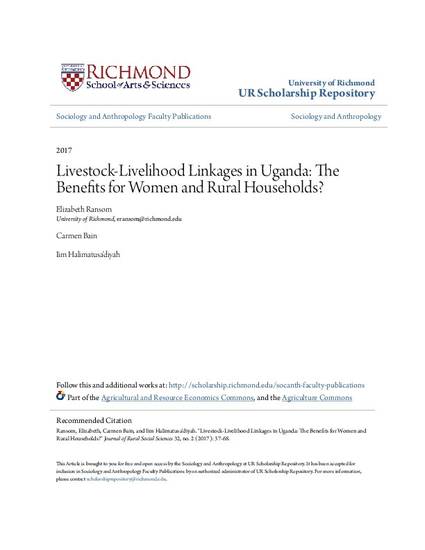
Livestock are an important component of rural households and gendered livelihood practices throughout sub-Saharan Africa. Widespread within the development literature is the belief in the livestock ladder, with poorer households often owning small stock and wealthier households owning large stock, with the assumption that poor households can utilize livestock to build their asset base and overtime this would allow poorer households to expand from small stock to large stock, in so doing climb the livestock ladder. There is also an assumption in the literature that women are more likely to oversee small stock. In addition, some well-known agricultural development programs have sought to empower women and households through livestock development schemes, working on the assumption that livestock can play an important role in providing a pathway out of poverty. Our research engages with the growing concern that livestock-livelihood linkages and their relationships to gender are not well understood within the existing literature or at the empirical level. This is in part due to a lack of data on the topic, which includes an over-reliance on household-level data, which does not allow for an analysis of intra-household livelihood-livestock linkages. Utilizing four separate data sets, this article analyzes whether the livestock ladder exists in Uganda, especially in the central and eastern regions of Uganda. We find evidence that income contributes to total number of animals owned at the household level, but the evidence concerning small stock being the domain of poorer households and women, is mixed. By comparing empirical evidence with the existing literature we can not only better understand the ways in which rural development programs can affect gendered livestock-livelihood practices, but also inform current theorizing and policy practices surrounding livestock-livelihood linkages.
Available at: http://works.bepress.com/carmen-bain/4/

This article is published as Ransom, E., C. Bain, and *I. Halimatusa'diyah. 2017. Livestock-Livelihood Linkages in Uganda: The Benefits for Women and Rural Households? Journal of Rural Social Sciences. 32(2): 37-68. Posted with permission.